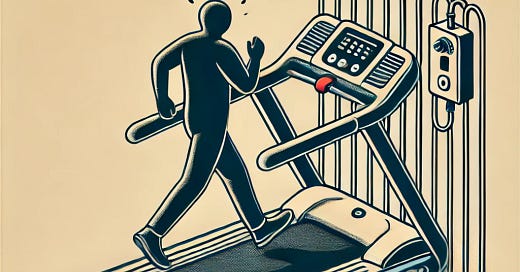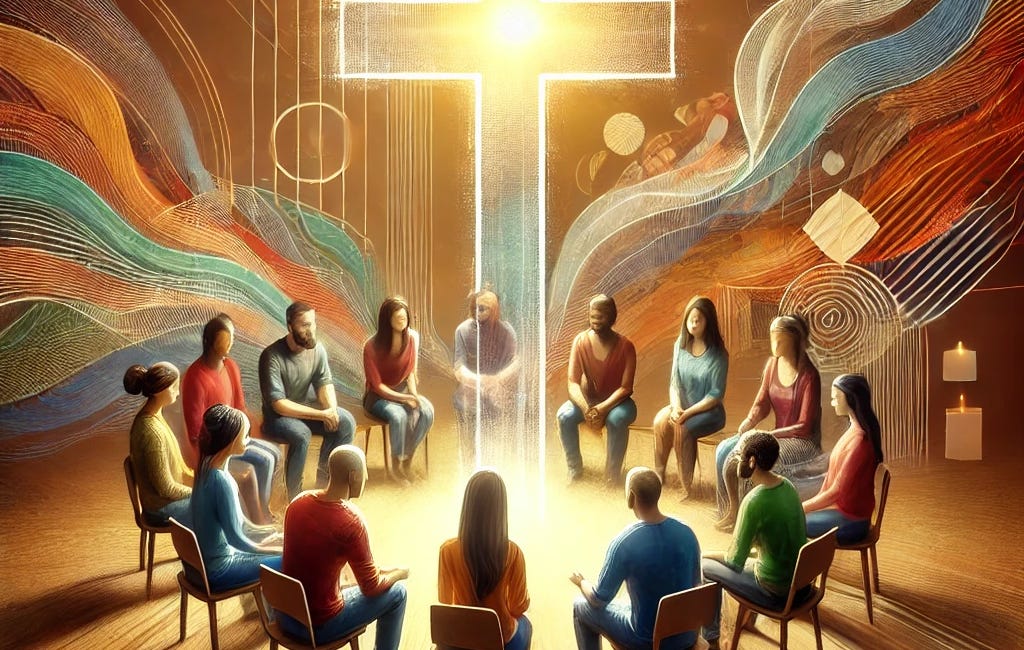I recently received an interesting comment on a recent post:
The main problem I see in the way this works itself out in the Mainline is theological. There is no forgiveness. It is all guilt and wallowing and repentance and confession and self-examination and accepting everyone else’s judgment and NOT ONCE have I ever heard a church leader or seminar speaker or anyone else pronounce the absolution. These things are all attempting to drive confession of complicity in Sins Against DEI, and some people are genuinely moved to repentance and begin to see things in a different light and cultivate more love for our neighbors and the only result is that we get more lectures and more seminars and more guilt. Nobody ever says “At the command of our Lord Jesus Christ, I forgive you all your sins. Go in peace.” Maybe we Christians could try that and see how it goes?
@readstoomuchpraystoolittle
Since I’d been workshopping a post on this very idea for some time, I thought I’d go ahead and put some metaphorical ink to paper.
I Don’t Want DEI to Fail: A Grace-Centered Alternative to Identity Politics
Going “Viral” and the Challenge of Commonality
The Problem With Perpetual Crisis Language
A few years ago, I interviewed J.J. Peterson from the Storybrand marketing team about churches and marketing. One key insight from our conversation stuck with me: people eventually become numb to fire-and-brimstone messaging.
Peterson framed this idea in the context of appeals for money and help from churches and nonprofits—while people will initially respond in moments of crisis, if crisis language is all they hear, they eventually tune it out. The same thing happens with relentless guilt-driven appeals. If people are constantly told how much they’ve failed, how broken they are, how much they must do to make things right—without the corresponding message of grace and redemption—they either become numb to the guilt or reject it altogether.
Is it any wonder, then, why so many Americans have tuned out progressive political messaging? The same relentless call to repent of societal sins, unaccompanied by grace, has led many to disengage entirely—or worse—embrace Trumpism.
The Anxiety-Repentance-Relief Model of Evangelicalism
The comment I received also reminded me of a past podcast conversation with J. Michael Jordan, author of Worship in an Age of Anxiety. In his book, Jordan critiques the emotional manipulation often found in Evangelical worship, particularly what he calls the “anxiety-repentance-relief model”:
Centralizing the anxiety-repentance-relief model in Christian worship has negative emotional consequences. Put simply, it means that some are constantly on alert while others never are. It keeps tender-hearted Christians emotionally homeless because they are so desperate to know God that they will hate themselves for no reason. For other Christians, it sears their conscience: they will not imagine they have anything to repent for because repentance would mean another exhausting and untenable journey through anxiety.
Having grown up in Fundamentalist and Evangelical Christianity, I know this model well. As a young believer, I constantly responded to altar calls, desperate to root out any uncertainty about my salvation. I needed assurance. But I also saw the other side—people who became so exhausted by the emotional rollercoaster of guilt that they shut down entirely.
Yet, in many ways of late, Mainline Protestantism takes this a step further. Instead of an anxiety-repentance-relief cycle, there’s an anxiety-repentance cycle with no relief—a perpetual guilt treadmill.
When There’s No Assurance: The New "Works-Based Salvation"
To frame my next point, I want to borrow language that might sound more at home in Fundamentalist circles: original sin and works-based salvation.
Mainline churches often speak of racism as America’s "original sin." While I absolutely affirm the persistence of systemic racism and its ongoing impact, I think the deeper issue is what my commenter noted: there is no forgiveness.
"Nobody ever says, ‘At the command of our Lord Jesus Christ, I forgive you all your sins. Go in peace.’”
If racism is understood in a Fundamentalist/Calvinist sense of "original sin," then there is no real opportunity—especially for white people—to find redemption. The cycle of repentance never ends. There is no assurance of forgiveness.
This leads to what is, functionally, a new works-based salvation. Instead of salvation by grace alone, Mainline Protestantism often presents a model where one must prove their righteousness through constant self-examination, anti-racism work, and public confessions.1 But, and this is the even scarier part—this salvation can be lost. If one does not “keep up to speed” and does falter, they risk being cast off.
Losing Salvation? The DEI Guilt Treadmill
Back in my Bible college days, we used to poke fun at the Assemblies of God students across the highway for believing they could “lose” their salvation. As good Calvinists, we believed in the Perseverance of the Saints—once saved, always saved.
The problem, we argued, with the losing-your-salvation model is that it creates anxiety, uncertainty, and exhaustion. What if you mess up? What if you unknowingly sin and die before repenting? What if you fall away for a season?
Ironically, this feels very similar the model I now see in DEI and anti-racism spaces, especially for white people. So often, there’s no grace, no assurance of redemption. There’s always another layer of complicity, another way to be blind to privilege, another moment where you could be called out and cast out.2
As my commenter put it:
“It is all guilt and wallowing and repentance and confession and self-examination and accepting everyone else’s judgment.”
And let me tell you—that is an exhausting place to be.
Where Do We Go From Here?
Others, like
, have written about this tension more eloquently, but I think the argument is worth repeating. We are witnessing scores of white men abandoning the guilt treadmill entirely and embracing Trumpism instead. That is not okay.To be crystal clear: I do not want to diminish the very real impact of racism. The statistics speak for themselves. The economic disparities are real. The emotional trauma is devastating. Countless individuals have been harmed or even brutalized because of their skin color. The way of Trumpism and rejecting DEI outright is not the way forward.
But I do wonder—like my commenter suggested—if a return to Confession and Assurance might help us move forward.
In historic Christian liturgy, we do not just confess our sins. We also hear like these:
Sisters and brothers hear the good news of the gospel;
In Jesus God’s grace is revealed
To heal our brokenness,
To forgive us our sins
And to set us free from all that would oppress us.
This is not about cheap grace. It’s not about sweeping injustice under the rug. As Paul said, "Should we sin so that grace may abound? By no means!" (Romans 6:1-2).
Rather, it is about returning to the heart of the Christian message—that in Jesus Christ, we can be forgiven and made new.
If we deny that forgiveness is possible—if we keep people in a perpetual state of guilt with no redemption—then we are, in effect, denying the power of the Gospel.
No doubt, we will sin again. Whether in word or deed, implicitly or explicitly, through individual acts of racism or participation in unjust systems, we will need to confess our sins.
So maybe we could try something different.
In Jesus Christ, our sins are forgiven and we have been made right with God. Go, therefore, with the Holy Spirit, and sin no more.
What would happen if we actually believed that?
I want to be explicit here that these efforts are good and helpful. But, I seek to make that point that in many ways, at least in my opinion and perhaps that of my commentator, they are presented like a guilt-treadmill on which one must keep up to speed.
I know “cancel culture” has been overplayed by conservatives, but there is some truth to it.






I understand reluctance to offer the "cheap grace" that stops with forgiveness and does not bear the fruit of repentance. However, "no grace" is self-defeating when it comes to reconciliation and community building.
Forgiveness is a powerful motivator for repentance and reconciliation. Without forgiveness, the burden of guilt is likely to transform into hatred for the one who inflicts the guilt, and this hatred so often finds justification for new offenses.
Where some see only unrepentant racism in the backlash against DEI, I perceive that the unintended consequences of what this article describes is a major factor.
Who bears the brunt is always the question before us. If all of life is repentance and the servant who owes more continues to rely on the servant who owes less to be more forgiving, then we are in fact discussing the need for defining Equitable Systems of Grace. It isn't just that White Guilt makes you feel bad, it's the lack of recognition of how White Systems have long perpetuated INEquity even within repentance. Who gets to decide how repentant you need to seem, and what does your church system perpetuate in the process of church discipline and the qualifications of those with power? It's all connected. This is not talking in vague, broadbrushed terms. Get specific. Trying to place blame on entire groups is what got us where we are in the first place. The guilt treadmill should be calibrated for the person walking on it.